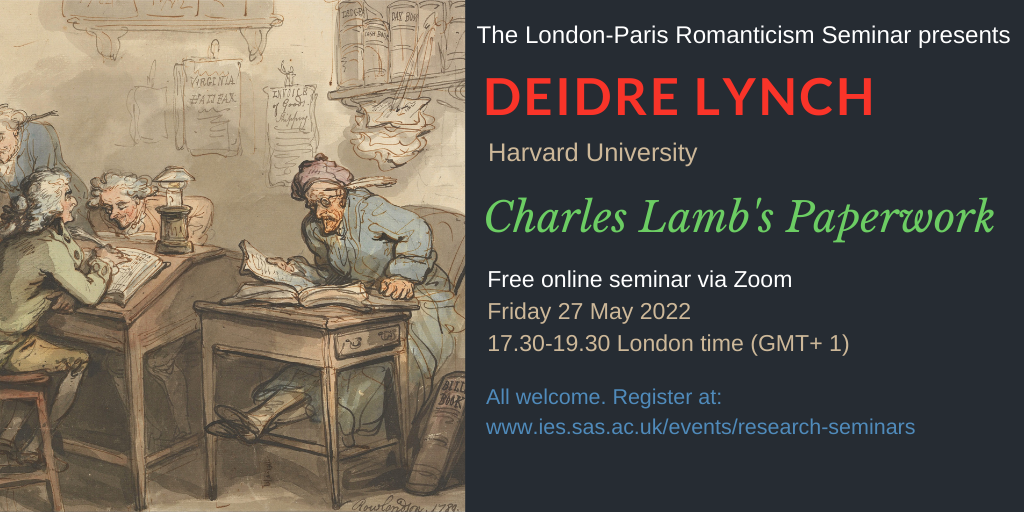
The next meeting of the London-Paris Romanticism Seminar will take place via Zoom on Friday 17 June 2022 (NOTE CHANGE OF DATE) at 17.30-19.30 London time (GMT+1). As our guest speaker, we are delighted to welcome Professor Deidre Lynch of Harvard University, who will present a paper entitled Charles Lamb’s Paperwork. This will be followed by a discussion in which questions from the audience are invited. The panel will be chaired by Luisa Calè (Birkbeck, University of London).
The seminar is free and open to everyone. Prior registration is necessary. To book a place via the Institute of English Studies website, click here. When you register, you will be provided with a Zoom link and details of how to join the online forum. Whether you wish to contribute or simply to listen in, we invite you to join us.
Deidre Lynch is Ernest Bernbaum Professor of English Literature at Harvard, and, in recognition of her excellence in teaching, Harvard College Professor. She was formerly Chancellor Jackman Professor at the University of Toronto. She was educated at the University of British Columbia and at Stanford University. She has published widely on the literature and culture of eighteenth- and nineteenth-century Britain, the theory and history of the novel, and the history of books and reading. Her books include The Economy of Character: Novels, Market Culture and the Business of Inner Meaning (1998), Loving Literature: A Cultural History (2015), finalist for the Phi Beta Kappa Christian Gauss Award for Literary Criticism, and (as editor or co-editor) Cultural Institutions of the Novel (1996) and Janeites: Austen’s Disciples and Devotees (2000). The Unfinished Book, co-edited with Alexandra Gillespie, was published last year by Oxford University Press.
Regarding the topic of her paper, Deidre writes:
‘This paper considers the equivocal status of penmanship in the Romantic era – from one vantage point, the essence of labor in a world increasingly defined by bureaucratic paperwork, but also, at a time when print set the standards for communicational efficiency, an emblem of the resistance of the amateur. In a more literal sense than usual, Charles Lamb “wrote for a living” – doing so as a British East India Company clerk. Lamb also authored, though the over-literal relationship to writing that informed his day job perhaps explains why his bona fides as professional author have often been an uncertain thing. Another cause of that uncertainty, though, involves the other sort of work on paper for which Lamb was celebrated: those he created as a participant in the Romantic-era album culture. To parse the distinctions among Lamb’s several writing practices can, I contend, enrich our understanding of the relations of amateurs and authors and of manuscript and print.’